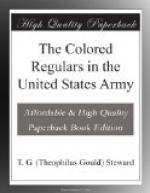As the capitulation was complete, and Santiago was our’s, we were ordered to change camp to a more healthful locality, with a view to allowing the men to recuperate. While en route many refugees were met returning to the city, men and women, with the scantiest clothing imaginable; large children even worse—in a nude state—all were making signs for something to eat.
In passing through El Caney, filth of all descriptions was piled up in the streets; stock was seen standing inside dwellings with occupants; young and old were emaciated—walking skeletons; children with stomachs bloated to thrice their natural size—due to the unsanitary condition of the huts, so I was informed.
The bare facts are, that “half has never been told” regarding the true condition of the Cubans, and it is truly a Godsend that “Uncle Sam” was not delayed another day in letting the Don’s breathe a little of nature’s sweetest fragrance of the nineteenth century—Civilization.
The portion of the island I saw appears to be a beautiful park deserted and laid waste by the lavish application of the torch for many years. Magnificent mansions, or dwellings, in ruins; habitation scant, except near towns.
There were no domestic animals, except a few for saddle purposes, nor were there crops to be seen. No use whatever appears to be made of the luxuriant pasturage and rich fields. Sugar houses and sheds on plantations are in a state of decay, and the huge kettles for boiling deeply coated with rust.
The climate of Cuba offers all the essentials, heat, moisture and organic matter, for the development of germ life in its most active form.
The great heat and moisture, so excellent for the development of infected wounds, and for the rapid decomposing of the heavy undergrowth cannot, I believe, be exceeded anywhere.
The frequent tropical showers, invariably followed by a hot steam, along with which germs seem to float; the consequent exposure of the men to that glaring heat and moisture, lowered the general tone of the system so that they were especially liable to attacks of miasmatic diseases (malarial and typhoid fevers and dysentery.)
Owing to the dense humidity, clothing does not dry so long as it remains on the person, but must be removed, a condition that was absolutely impossible for many days on the field before Santiago. To this alone, much of our sickness may be attributed.
Our new camp, pitched on the eminence of El Caney, about one and one-half miles from the village, overlooking the city and bay of Santiago, with its excellent water, shade, grass, and increased comforts, which were daily shipped from our transports, presented a scene far more conciliatory than had been witnessed about the Tenth Horse for many days.
MEDALS OF HONOR AND CERTIFICATES OF MERIT GRANTED TO COLORED SOLDIERS FOR DISTINGUISHED SERVICES IN THE CUBAN CAMPAIGN.




